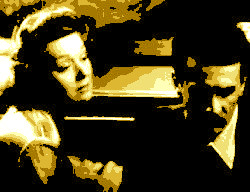Film Review
After the handsomely stylised
Maya (1949) it is surprising
that Raymond Bernard should follow this with a film noir made on far
more traditional lines, one that is virtually indistinguishable from
classic American noir of the period. With most of the action
confined to a few interior locations,
Le
Cap de l'Espérance (also known by its Italian title
La Nostra pelle) has a hard job
disguising its origins as a stage play (Jean-José Lacour's
Notre Peau) but thanks to Bernard's
confident and imaginative direction it makes an effective pastiche of American film
noir, leaving practically no cliché unturned in its attempt to
give French audiences of the time what they presumably wanted.
Slick though the film is (the lighting and camerawork are particularly impressive,
contributing almost everything to the mood and tension of the piece),
it is formulaic to a tee and only Edwige Feuillère's character,
the morally ambiguous bar owner Lyna, manages to transcend the familiar
noir archetype. Franck Villard's two-timing Bob is virtually
impossible to engage with, as the actor plays him as a one-dimensional
heel (the script preventing him from doing otherwise), and the fate of
Cosetta Greco's Minnie is far too well sign-posted to have any real
impact. It is Feuillère's magnificent performance alone that elevates the film
above the mundane (the final shot of her walking on a desolate seashore
is one of the most haunting in Bernard's entire oeuvre), but after the eerily
oniric
Maya, one of the
director's most inspired films,
Le
Cap de l'Espérance can only come as a bitter let down.
© James Travers 2015
The above content is owned by frenchfilms.org and must not be copied.
Next Raymond Bernard film:
Le Jugement de Dieu (1952)
Film Synopsis
Bob Legeay, a failed lawyer, ends up in a Mediterranean port where he
becomes mixed up with a gang of crooks whilst sponging off his mistress
Lyna, an older woman who runs a popular bar in the locality.
Tired of being a gigolo, Bob plans to elope with his new girlfriend,
Minnie, the daughter of one of his crooked friends, after the latter
have stolen a large quantity of gold from the safe of a wealthy ship
owner. The robbery goes far from planned. One of the crooks
is wounded and captured by the police as his associates make their
getaway with their hard won loot. Although she soon realises
Bob's intentions, Lyna cannot bring herself to betray him. As the
police close in on them, the criminals agree that Lyna must be
silenced...
© James Travers
The above content is owned by frenchfilms.org and must not be copied.


